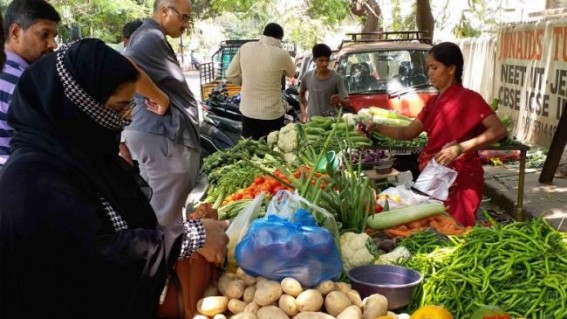TIWN

New Delhi, March 22 (TIWN) People can buy food and grocery items and can also travel but only for emergency purpose, the government on Sunday clarified after it was decided to lock down COVID-19-affected districts across the country.
State governments have been advised to issue appropriate orders to allow only essential services to operate in these 80 districts. It was also stated that the state governments may expand the list depending on their assessment of the situation. Here is what ''essential'' means:
What are essential commodities?
At present, there are seven commodities scheduled under the Essential Commodities Act, 1955, as essential drugs; fertilizer, whether inorganic, organic or mixed; foodstuffs, including edible oil seeds and oils; hank yarn made wholly from cotton; petroleum and petroleum products; raw jute and jute textile; seeds of food-crops and seeds of fruits and vegetables; seeds of cattle fodder; and jute seeds and cotton seed.
The Essential Commodities Act, 1955 was enacted to ensure the easy availability of essential commodities to consumers and to protect them from exploitation by unscrupulous traders.
What are essential services?
The essential services are any postal, telegraph or telephone service, including any service connected therewith; railway service or any transport service for the carriage of passengers or goods by air and any service connected with the operation or maintenance of aerodromes, any service in any major port.
These also include any service connected with the clearance of goods, any service in any establishment of the armed forces, any service in any establishment dealing with the production of goods required for defence, and any service in any section of any industrial undertaking pertaining to a scheduled industry on the working of which the safety of such undertaking or the employees employed therein depends.
The industrial undertakings includes any service in, or in connection with the working of, any system of public conservancy, sanitation or water supply, hospitals or dispensaries, cantonment, area or undertaking owned or controlled by the government.
It also includes any service in connection with or in relation to banking and other government service.
Essential service restricted
However, the government has restricted the carriage of passengers through train and metro rail. The various districts are taking independent measures whether to close or allowed to remain open of private offices which are not related to emergency services.
The districts, which are COVID-19 affected areas, have invoked colonial era Epidemic Diseases Act, 1897 and section 144 of the Criminal Procedure Code (CrPC) of 1973 to restrict movement of people and spreading of the virus.
These districts have issued respective orders to restrict movement of people under these two Acts. Gathering of less than four people is allowed at any public place, and in states where most of the orders issued by the respective local administrations of 80 districts where Section 144 has been imposed.
Prohibitory orders under Section 144
Under Section 144 of the Criminal Procedure Code (CrPC) of 1973 authorises the Executive Magistrate of any state or territory to issue an order to prohibit the assembly of four or more people in an area. According to the law, every member of such ''unlawful assembly'' can be booked for engaging in rioting.
Section 144 is imposed in urgent cases of nuisance or apprehended danger of some event that has the potential to cause trouble or damage to human life or property. Section 144 of CrPC generally prohibits public gathering.
Prohibition under Epidemic Diseases Act
The 1897 Act gives the power to take special measures and prescribe regulations against dangerous epidemic disease. Under the Act, temporary provisions or regulations can be made to be observed by the public to tackle or prevent the outbreak of a disease.
It may also give authorities the power to inspect "persons travelling by railway or otherwise, and the segregation, in hospital, temporary accommodation or otherwise, of persons suspected by the inspecting officer of being infected with any such disease".
- India feels the sting as Trump slaps $100,000 fee on H-1B visas
- Bihar Women’s Commission issues notice to Rahul Gandhi, Tejashwi Yadav over remarks on PM Modi’s mother
- ED raids 13 locations linked to AAP leader Saurabh Bharadwaj in hospital construction scam case
- CM Rekha Gupta, Union Minister Jitendra Singh receive astronaut Shubhanshu Shukla at Delhi airport
- IndiGo aircraft's tail touches runway at Mumbai Airport



